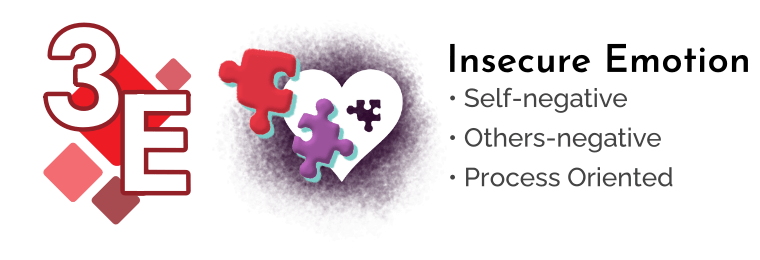
The 3E attitude is characterized by a self-negative (Es-) and others-negative (Eo-) disposition. This disposition creates an attitude that is plagued by an awareness of limitations, weakness, harm, negative consequences, and manipulation within the realm of emotion. This awareness applies internally, externally, and within the exchange of information in the aspect. 3Es have a keen sense of how they can be harmed by emotion. The strategies that each 3E employs to deal with the insecurity may differ in behavior or execution but the core attitude of subjective vulnerability and insecurity will remain consistent for all 3Es. Below are some common beliefs and behaviors that you may see with 3Es. Please keep in mind that these are generalities and do not represent the vast sub-archetypes held within the overall 3E attitude.
Dichotomies
Uncertain • Insufficient • Weak • Aggressive • Subjective • Vulnerable • Wordy • Expansive • Universal
Inner Conflict
• Are confused and sometimes stunted by emotional turmoil happening inside them.
• May feel faltered in their relationships if they are not given ample reassurance that they are allowed to express themselves or withhold when needed.
• Are unsure and pressured by their intuitions of people as they do not know if they should trust them.
• At times, go on long tirades of emotional outbursts (positive or negative) due to holding them in for extended time periods.
• Can cause themselves paranoia in wondering what it means to love, like, dislike, or feel a certain way about others.
• May be puzzled by art and the emotional sensation it gives them when it is not directly clear what is being expressed.
• Do not trust what their deep desires mean and how to interpret them, but wish to understand them.
Reactive Phase
• Can over-identify with negative emotions and respond aggressively to those who reject, challenge or pressure their own perspective.
• Tend to be sensitive to personal differences with others and try to force them to behave the way they desire them to.
• Go overboard with their emotions and become venomous which causes regret that can further lead to even more explosive reactions towards others.
• Focus entirely too much on the impossible standards that they believe their relationships should live up to.
• Reject the emotions of others if they feel too judgmental, assured, or arrogant.
• Become raw, angry, loud, aggressive, and explosive to anyone who makes them feel emotionally cut off.
Dormant Phase
• Can try to ignore their emotions in order to feel a sense of calm.
• Ignores their inner reactions because it causes too much anxiety.
• Acts like they are never offended, then secretly seethes in isolation.
• Feels weary and escapes the company of people who are emotionally open.
• Convinces themselves that they do not care about their emotions.
• Avoids all situations in which they are expected to produce emotional content.
• Becomes stressed by any instance where they have to entertain or open up to others.
• Shuts off entirely and pretends that everything is fine, “going with the flow” to get along with others, despite their negative feelings.
Secure Phase
• Understand their own emotions towards certain people and become comfortable in these emotions long-term.
• An acceptance of the normal ebbs and flows of a relationship.
• Find an outlet to share their passions and emotions in a healthy, stable way.
• Feel a sense of brevity in emoting the feelings that have been swirling inside of them.
• Find hidden abilities in art, poetry or song that were unfounded until they explored it.
• Become comfortable in who they are and how that relates to those around them.
• Realize that emotions are meant to be volatile, and letting them express and pass as they are supposed to will foster a feeling of security.
• Adopts a curious attitude about the feelings of those around them.